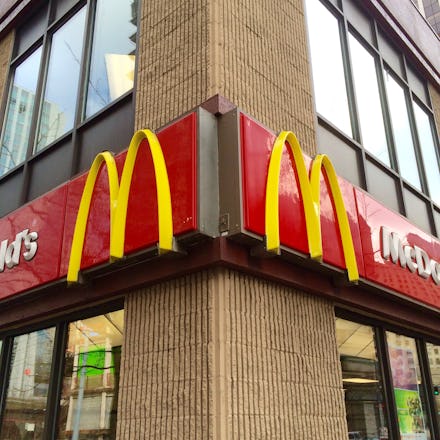The Resignation Of McDonald's CEO Proves Americans Are Revolting Over Fast Food

McDonald's CEO has resigned. After 25 years with the company, and fewer than three as chief executive, Don Thompson stepped down last week.
The resignation comes after a year of abysmal financial performance: 2014 was the first time the corporation experienced an annual decline in same-stores sales globally in over a decade. Under Thompson's reign, McDonald's has seen sluggish growth and loss of investor confidence. The company's stock price soared on the news of Thompson's resignation.
The company's chief brand officer, Steve Easterbrook, is set to replace Thompson. He's expected to draw from his experience polishing McDonald's reputation for its U.K. restaurants.
But McDonald's needs more than a dapper new captain. The company isn't sinking because it needs better brand management, but because taste across the country is transforming. McDonald's unabashed appetite for profit, at the expense of food fit to serve and at the expense of its poorly paid workers, is falling out of vogue — and the company is paying the price.
People like their food fast, but not that fast: Industry observers have noted McDonald's struggles with sales for years now, and there's an emerging consensus that profoundly unhealthy food is no longer as marketable as it once was.
Since the turn of the millennium, fast food has endured a growing barrage of criticism for its health and preparation practices, and McDonald's has become centerpiece of its most strident indignation. Depictions of assembly-line preparation and the extraordinary toll that Big Macs take on your health have been documented in popular books and documentaries such as Fast Food Nation, Super Size Me and Food Inc. Global foodie and television show host Anthony Bourdain once said that a Chicken McNugget is the most disgusting thing he's ever eaten. Photos of McDonald's burgers that never seem to decompose make the rounds on the Internet regularly.
McDonald's has borne the consequences for its disregard for its own customer's health. Fast food experts have compared the chain's performance to its competitors and pointed to the success of restaurants that use fresh ingredients from healthy sources in recent years. In recent years, Chipotle has outshone McDonald's in sales and profit growth, and it's widely touted as the new standard for fast food. It's worth noting that McDonald's once had a 90% stake in Chipotle, but divested after Chipotle's founder toured a McDonald's chicken farm and found it to be "absolutely the most disgusting thing" he had "ever seen in his life." (That tour isn't cited as the reason for their parting ways, but it serves as an example of their differences.)
The rise of Shake Shack, whose food is a bit more expensive than McDonald's on average, has been attributed to customers' preference for ingredients that haven't been processed in a factory. Even if people are eating something they consider a greasy indulgence, they're increasingly discerning about the nature and origins of that greasy indulgence.
Young Americans, whose colossal purchasing power is perhaps more important than that of any other generation, exemplify this trend. Millennials don't like McDonald's because they value quality and choice. And saccharine Super Bowl commercials about paying for burgers with hugs isn't winning them over.
A reputation for worker neglect: McDonald's treats its employees about as poorly as it handles its food, and recently that's been doing them no favors in the eyes of the public.
Americans are increasingly aware of the dire conditions that McDonald's workers face. It is a company that has advised its employees to manage their budgets by getting a second job and living without necessities like heating. It's a company that has neglected to help employees pleading for help after local management said there were "too many black people" in the restaurant.
It's a company that has been slapped with 78 charges of labor violations by the National Labor Relations Board, a sign that McDonald's may no longer able to get away with its exploitative practices by dumping all responsibility on franchise operators.
McDonald's has been one of the central targets of the Fight for 15 Campaign, a movement by low-wage workers protesting for a $15 per hour wage and the right to organize into unions. McDonald's is probably the most frequent backdrop for strikes and rallies organized by employees who are living on poverty-level wages.
While virtually all fast-food workers in the United States are underpaid and face obstacles to union organizing, McDonald's is considered the most important one of the lot to target. Labor organizers know that if you take down the head of the pack, then it's more likely that others in the industry will learn. And right now, it seems to be working.
The new CEO of McDonald's will have a lot on his plate. If he thinks that new packaging and messaging can do the job, he will likely oversee the corporation's continuing decline.